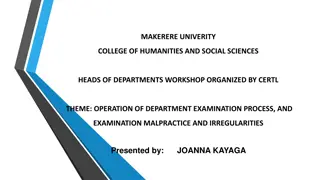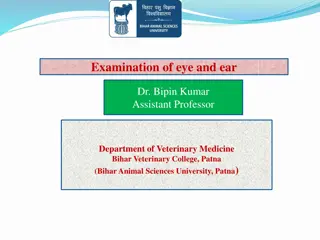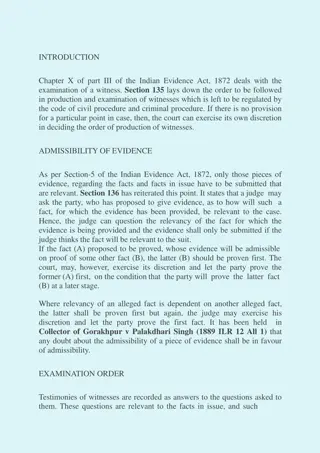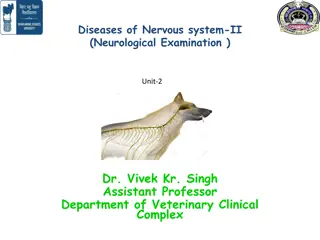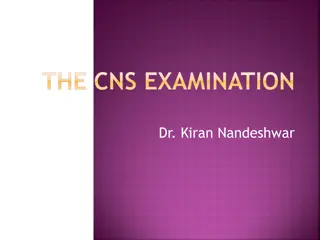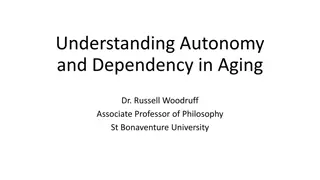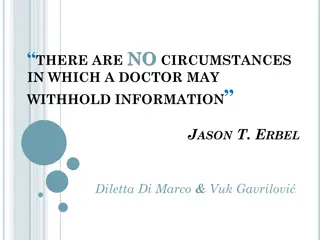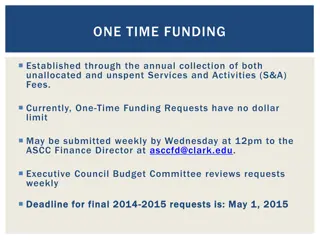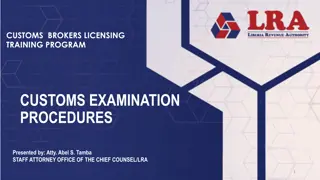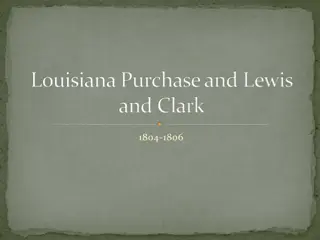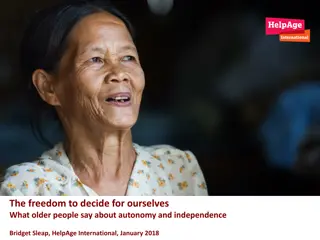Examination of Free Will and Individual Autonomy in "Whose Life is it Anyway?" by Brian Clark
The play "Whose Life is it Anyway?" by Brian Clark delves into the complex debate of free will and individual autonomy versus authority and bureaucracy in the context of healthcare. Ken Harrison, paralyzed from the neck down, challenges the medical profession and explores the limits of personal freedom in making life-altering decisions. Through Ken's interactions with Nurse Sadler, Sister Anderson, and Dr. Emerson, the play navigates themes of identity, self-determination, and societal expectations. Clark presents a thought-provoking narrative that questions the essence of life and the extent to which individuals should have control over their own destinies.
Download Presentation

Please find below an Image/Link to download the presentation.
The content on the website is provided AS IS for your information and personal use only. It may not be sold, licensed, or shared on other websites without obtaining consent from the author.If you encounter any issues during the download, it is possible that the publisher has removed the file from their server.
You are allowed to download the files provided on this website for personal or commercial use, subject to the condition that they are used lawfully. All files are the property of their respective owners.
The content on the website is provided AS IS for your information and personal use only. It may not be sold, licensed, or shared on other websites without obtaining consent from the author.
E N D
Presentation Transcript
Whose Life is it Anyway? by Brian Clark
Issues Ken Harrison is determined to decide his own fate whilst those who are responsible for his care are equally determined to keep him alive. How does the play present both sides of the argument? How far is the play about the individual versus authority and bureaucracy? How does Brian Clark try to avoid sentimentality and how well does he succeed? How fairly is the medical profession presented in the play? Do Ken s personality and background help or hinder the play s discussion of free will? How far should an individual have free will?
Ken and Nurse Sadler (Kay) Nurse Sadler is about to finish her training. She makes the mistake of giving Ken her first name instead of introducing herself as Nurse Sadler. She is not yet a fully-fledged member of what Ken calls the monstrous regiment or the optimism industry .
Sister Anderson The ward sister Calm, efficient She tells Kay Sadler (and the audience) that Mr Harrison will not ever get better: When we have him fully stabilised, he ll be transferred to a long stay hospital for the rest of his life . As the play opens it is four months since the accident which paralysed Ken from the neck down.
Ken Harrison I don t wish to die Nor do I wish to live at any price. Of course I want to live but as far as I am concerned, I m dead already. I merely require the doctors to recognise the fact. I cannot accept this condition constitutes life in any real sense at all.
We went midnight skateboarding The only problem was that I was the skateboard. (About his bed) it s so beautifully made, I can t feel a thing. To John: Still, you must be in charge of the compost heap. That s where I should be. To Dr Emerson: You mean you only grow the vegetables here the vegetable store is somewhere else. even though I ve only a piece of knotted string between my legs, I still have a man s mind.
I know everyone around here acts as though those little bits of paper have just been handed down from Sinai. But the writing on those tablets isn t in Hebrew Of Dr Emerson: I suppose he ll sweep in here like Zeus from Olympus, with all his attendant nymphs and swains. John: I m only a labourer in this here vineyard. Fertilisers and pruning and bedding out is up to the head gardener.
Oh, I shall get the tablet, but its you that needs the tranquillizing; I don t you can t do anything for me nothing that really matters. I m paralysed and you re impotent The only thing you can do is stop me thinking about it that is stop me disturbing you. So I get the tablet and you get the tranquillity. Dr Emerson to Dr Scott: We must help him to an acceptance of his condition. Only then will his full consciousness be of any use to him at all Dr Emerson, I am afraid I must insist that you do not stick that needle in me. I take it that the injection is one of a series of measures to keep me alive I ve decided not to stay alive. Please let me make myself clear. I specifically refused permission to stick that needle in me and you didn t listen. You took no notice.
Mrs Boyle a medical social worker Ken: I d better see her. If I refuse, he ll probably dissolve her into water and inject her into me. Mrs Boyle: I ve seen many patients like you They find a new way of life You ll be surprised how many things you will be able to do with training and a little patience. Ken: I really have absolutely no desire at all to be the object of scientific virtuosity. I do have plenty of time for thinking and I have decided that I do not want to go on living with so much effort for so little result. You and the doctors with your appalling so-called professionalism, which is nothing more than a series of verbal tricks to prevent you relating to your patients as human beings. The very exercise of your so-called professionalism makes me want to die.
John a ward orderly You can t take a place like this seriously It s just the ante- room of the morgue. How much does it cost to keep him here? Hundreds of pounds a week In Africa children die of measles. It would cost only a few pounds to keep them alive. There s something crazy somewhere. Ken says of John (to nurse Kay Sadler): He s free! Free of guilt. Most everybody here feels guilt about me including you. That s why you didn t want to tell me what a fantastic time you had dancing. So everybody makes me feel worse because I make them feel guilty. But not John. He s sorry for me but knows bloody well it isn t his fault. He s a tonic.
Dr Emerson: No, Clare, a doctor cannot accept the choice for death; he s committed to life. When a patient is brought into my unit, he s in a bad way. I don t stand about thinking whether or not it s worth saving his life, I haven t the time for doubts. I get in there, do whatever I can to save life. I m a doctor, not a judge. Dr Scott: I hope you will forgive me sir, for saying this, but I think that is just how you are behaving as a judge. Dr Emerson: Mr Harrison is now physically stable. There is no reason why he should die: if he should die suddenly, I would think it necessary to order a post-mortem and to act on whatever was found. Dr Scott: Mr Harrison is your patient sir. Dr Emerson: You make that sound a fate worse than death. Dr Scott: Perhaps for him it is.
Mr Hill (Kens solicitor) Mr Hill, with all respect, I know that our hospitals are wonderful. I know that many people have succeeded in making good lives with appalling handicaps. I m happy for them. But each man must make his own decision. And mine is to die quietly and with as much dignity as I can muster and I need your help. (To Dr Emerson): I told Mr Harrison I would talk to you first. Now I have and I begin to see why he thought it necessary to be represented. I m sure it is morally wrong for anyone to try to hand the responsibility for their death to anyone else. And it s wrong to accept that responsibility, but Ken isn t trying to do that. Habeas corpus Latin for you may have the body (Ken s barrister) Kershaw: it s against the law to deprive anyone of their liberty without proper cause.
You have lovely breasts Did I embarrass you? ... It s surprising how relaxed a woman can become when she is not in the presence of a man. I don t want to become happy by becoming the computer section of a complex machine. And morally, you must accept my decision. Dr Scott: Not according to my morals. Ken: And why are yours better than mine? They re better because you re more powerful. I am in your power. To hell with a morality that is based on the proposition that might is right. He s so bright intelligent He says he wants to die. It s marvellous you know. We bring him back to life using everything we ve got. We give him back his consciousness, then he says: But how do I use it? So what do we do? We put him back to sleep. I was saying, isn t that just the point, isn t that what this fight has shown you? That you are a human being again. You re not fighting for death. I don t think you want to win have you changed your mind? are you sure? Ken: Yes, quite sure, for me life is over. I want it recognised because I can t do the things I want to do. That means I can t say the things I want to say.
The Hearing Dr Emerson: It s impossible to injure the body to the extent that Mr Harrison did and not affect the mind. It is common in these cases that depression and the tendency to make wrong decisions goes on for months , even years. Dr Barr (psychiatrist): I thought he made the wrong decision. Judge: You tell me why it is a reasonable choice that you decide to die. Ken: the dignity starts with their choice. If I choose to live, it would be appalling if society killed me. If I choose to die, it is equally appalling if society keeps me alive. Judge: We must, in this case, be most careful not to allow Mr Harrison s obvious wit and intelligence to blind us to the fact that he could be suffering from a depressive illness However, I am satisfied that Mr Harrison is a brave and cool man who is in complete control of his faculties and I shall therefore make an order for him to be set free. Judge: Well you got your hanging judge. Ken: I think not my Lord. Thank you.
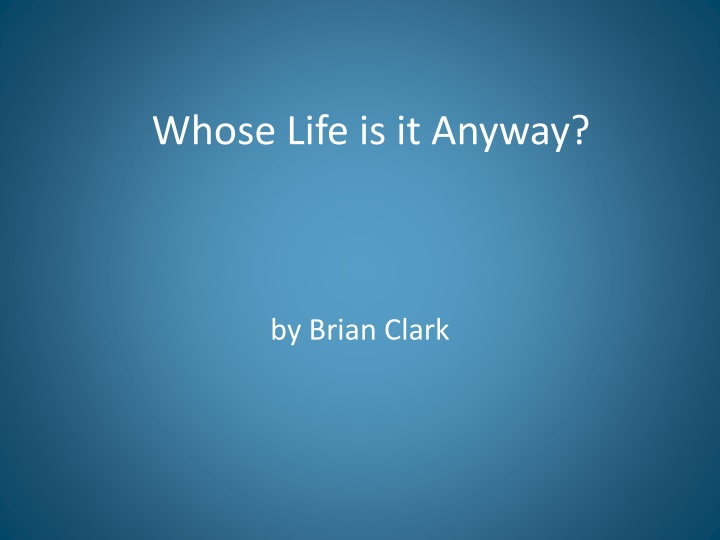


![❤[PDF]⚡ Zee Zee Does It Anyway!: A Story about down Syndrome and Determination](/thumb/20462/pdf-zee-zee-does-it-anyway-a-story-about-down-syndrome-and-determination.jpg)


